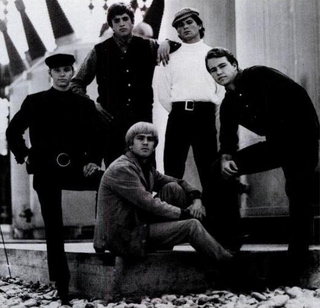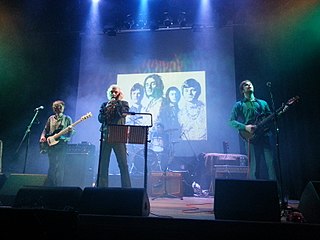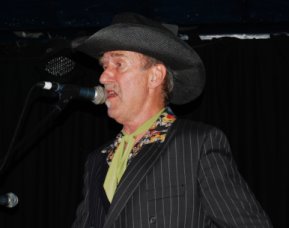
"Jabberwocky" is a nonsense poem written by Lewis Carroll about the killing of a creature named "the Jabberwock". It was included in his 1871 novel Through the Looking-Glass, the sequel to Alice's Adventures in Wonderland (1865). The book tells of Alice's adventures within the back-to-front world of Looking-Glass Land.

Through the Looking-Glass, and What Alice Found There is a novel published on 27 December 1871 by Lewis Carroll and the sequel to Alice's Adventures in Wonderland (1865). Alice again enters a fantastical world, this time by climbing through a mirror into the world that she can see beyond it. There she finds that, just like a reflection, everything is reversed, including logic.

The Hunting of the Snark, subtitled An Agony in 8 Fits, is a poem by the English writer Lewis Carroll. It is typically categorised as a nonsense poem. Written between 1874 and 1876, it borrows the setting, some creatures, and eight portmanteau words from Carroll's earlier poem "Jabberwocky" in his children's novel Through the Looking-Glass (1871).

The Electric Prunes are an American psychedelic rock band, formed in Los Angeles, California, in 1965. Much of the band's music was, as music historian Richie Unterberger described it, possessed of "an eerie and sometimes anguished ambiance." It mainly consisted of material by songwriters Annette Tucker and Nancie Mantz, though the group also penned their own songs. Incorporating psychedelia and elements of embryonic electronic rock, the band's sound was marked by innovative recording techniques with fuzz-toned guitars and oscillating sound effects. In addition, guitarist Ken Williams' and singer James Lowe's concept of "free-form garage music" provided the band with a richer sonic palette and exploratory lyrical structure than many of their contemporaries.

Country Joe and the Fish was an American psychedelic rock band formed in Berkeley, California, in 1965. The band was among the influential groups in the San Francisco music scene during the mid- to late 1960s. Much of the band's music was written by founding members Country Joe McDonald and Barry "The Fish" Melton, with lyrics pointedly addressing issues of importance to the counterculture, such as anti-war protests, free love, and recreational drug use. Through a combination of psychedelia and electronic music, the band's sound was marked by innovative guitar melodies and distorted organ-driven instrumentals which were significant to the development of acid rock.

A bandersnatch is a fictional creature in Lewis Carroll's 1871 novel Through the Looking-Glass and his 1874 poem The Hunting of the Snark. Although neither work describes the appearance of a bandersnatch in great detail, in The Hunting of the Snark, it has a long neck and snapping jaws, and both works describe it as ferocious and extraordinarily fast. Through the Looking-Glass implies that bandersnatches may be found in the world behind the looking-glass, and in The Hunting of the Snark, a bandersnatch is found by a party of adventurers after crossing an ocean. Bandersnatches have appeared in various adaptations of Carroll's works; they have also been used in other authors' works and in other forms of media.

The Mock Turtle is a fictional character devised by Lewis Carroll from his popular 1865 book Alice's Adventures in Wonderland. Its name is taken from a dish that was popular in the Victorian period, mock turtle soup.
Tomorrow were an English musical group active in the 1960s, whose music touched on psychedelic rock, pop and freakbeat. Despite critical acclaim and support from DJ John Peel who featured them on his "Perfumed Garden" radio show, the band was not a great success in commercial terms. They were among the first psychedelic bands in England along with Pink Floyd and Soft Machine. Tomorrow recorded the first ever John Peel show session on BBC Radio 1 on 21 September 1967. The band included Steve Howe on guitars, who would later join the British prog band Yes.
Grapefruit were a London-based British band of the late 1960s, brought together by Terry Doran of Apple Publishing, a music publishing company started and owned by the Beatles. Their brand of music was a typical late 1960s blend of rock, which they often fused with psychedelic effects such as phasers and vocoders, or classical arrangements.
"Set the Controls for the Heart of the Sun" is a song by the English rock band Pink Floyd, appearing on their second album, A Saucerful of Secrets (1968). It was written by Roger Waters, taking lyrics from a Chinese poetry book, and features a drum part by Nick Mason played with timpani mallets. It is the only song recorded by Pink Floyd to feature material from all five band members, as there are several different guitar parts recorded by both David Gilmour and Syd Barrett.

Lewis Carroll's books Alice's Adventures in Wonderland (1865) and Through the Looking-Glass (1871) have been highly popular in their original forms, and have served as the basis for many subsequent works since they were published. They have been adapted directly into other media, their characters and situations have been appropriated into other works, and these elements have been referenced innumerable times as familiar elements of shared culture. Simple references to the two books are too numerous to list; this list of works based on Alice in Wonderland focuses on works based specifically and substantially on Carroll's two books about the character of Alice.

Kaleidoscope are an English psychedelic rock band from London that originally were active between 1967 and 1970. It is not to be confused with the American psychedelic folk band of the same name. The band's songs combined the elements of psychedelia with whimsical lyrics. The band were also known at various times as The Sidekicks, The Key, I Luv Wight and Fairfield Parlour.

Samuel Hutt, known by the stage name Hank Wangford, is an English country and western songwriter.
Opal Butterfly was an English psychedelic rock band from Oxfordshire, that was active between 1968 and 1970. Although the band itself did not gain widespread success, the musicians did go on to conduct successful musical careers. The band featured Simon King (drums) and for a short time, Lemmy, who later joined Hawkwind. Further members were Robert "Robbie" Milne, Allan Love, Richard Bardey (bass), and Tommy Doherty. The band released three official singles of the heavy psychedelic rock style before disbanding.
Tintern Abbey were a British psychedelic rock band that were formed in late 1966 and professionally active between 1967 and 1968. The band are best remembered for their single "Vacuum Cleaner," which has been included on several compilation albums over the years.

Love and Poetry is the first studio album by British psychedelic band Andwella's Dream. It was released in 1969 on CBS Records.

"The Mock Turtle's Song", also known as the "Lobster Quadrille", is a song recited by the Mock Turtle in Lewis Carroll's 1865 novel Alice's Adventures in Wonderland, accompanied by a dance. It was taught to him at school by his teacher called Tortoise.
Beautiful Soup may refer to:
The Flies, also known as No Flies on Us, were an English psychedelic pop band formed in London in 1965. Releasing three singles during their recording career, the group is best-remembered for a cover version of "(I'm Not Your) Stepping Stone". Although the Flies' rendition of the song was not too commercially successful, it, along with the band's other material, has since received notice as a result of "(I'm Not Your) Stepping Stone"'s appearance on the early psychedelic compilation album Chocolate Soup for Diabetics, Volume 1.
Joseph Duveen, 1st Baron Duveen (1869–1939) is a British art dealer.












